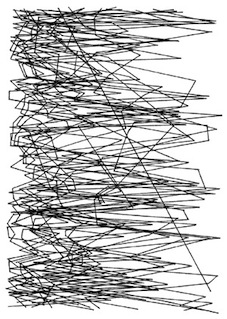Posts from May 2016
Image courtesy of Derek Beaulieu
Thursday 30 June 2016
Parasol Unit, 14 Wharf Road, London N1 7RW
In the Editorial for the first issue of Art-Language (1969) Terry Atkinson raised questions about a possibility of combining creative and critical practice: ‘can this editorial,’ Atkinson wrote, ‘in itself an attempt to evidence some attributes as to what “conceptual art” is, come up for the count as a work of conceptual art?’ Forms of Criticism takes Atkinson’s idea as its starting point to engage with issues of criticism and form and interrogate limits between creative and critical practice.
In poetry, fine art, film making, performance – in the creative sector – we are familiar with and applaud – or tolerate, in the very least – experiments which blur or transgress boundaries of genre, form, or creativity. Similar possibilities of formal experimentation remain significantly underexplored with respect to critical practice, although a growing interest in probing the limits of criticism can currently be observed. Forms of Criticism proposes to think about critical practice as a creative experiment with form in its own right and invites a re-examination of the relationship between research and forms adopted for presenting, communicating, and disseminating it. By considering diverse sites of critical and creative production the project focuses on experimenting with modalities of criticism and ways of addressing formal critical-creative hybridity.
The event brings together artist, curators, writers, critics and scholars addressing questions of hybrid creative-critical forms in theory and practice though talks, performances, screenings, readings and installations. Speakers include: John Beck (IMCC), Kate Briggs (American University in Paris), Eric Cazdyn (University of Toronto), Ducks!, Gary Hall (Coventry University & Open Humanities Press), Peter Jaeger (poet and critic, Roehampton), Kristen Kreider (poet and artist, Royal Holloway), Richard Misek (filmmaker), Simon Morris (Leeds Beckett University), Jo Collinson Scott (musician and musicologist), Marquard Smith (Journal of Visual Culture and Piet Zwart Institute, Rotterdam), and Nick Thurston (artist, University of Pennsylvania and Leeds).
The event is free and open to all but places are limited and booking is essential. For more information about the event and to reserve tickets please go to: http://www.formsofcriticism.net/
For more information, please contact Kaja Marczewska: k.marczewska@westminster.ac.uk
Saturday 1 July 2016, 10am-6pm
The Boardroom, University of Westminster, 309 Regent Street, London, WIB 2UW
Literary criticism has historically been practised using three broad models: a close attention to form; a consideration of the way that histories of ideas, identities and social forms are apparent in literary work; a more sociologically oriented consideration of practices of production and reading. From the twentieth century on, while the relations among these, and the prioritising or marginalising of each, shifted and changed, the mutual shaping of literary writing and its means of production has been consistently ignored. In contemporary literary criticism, while much literary critical work combines the first and the second, very little considers all three. Detailed consideration of the way that formal elements are shaped by and interact with the production and dissemination of writing remains almost absent from the discipline. At the same time, the limits of mainstream publishing and the growth of the small press have each been particularly visible since the economic crash of 2008, yet an investigation of the relation between this and the kinds of writing studied and interpreted has not emerged. Literary Criticism and the Small Press: A Symposium aims to draw attention to and investigate this absence through three broad themes. The location of the small press as the site of formal innovation is clear from the end of the nineteenth century, and its role in the dissemination of modernism is well known. How has this relation changed over the last century or so, and what are the interventions or absences in the literary critical work with regard to it? From William Morris to the digital revolution, the relation of the small press to writing has made central the question of materiality. What is the relation between material and linguistic forms? The relation of the small press to the mainstream, the material forms of writing and linguistic innovation are all mediated and determined by the institutions within which they exist — publishing, bookselling, the university, government funding of the arts and universities, and so on. How do these institutions shape what is published, where and for whom?
The symposium will consist of three panels:
Materialities: Nicholas Thoburn; Sophie Seita
Institutions: Claire Squires; Lisa Otty; Nick Thurston; Matvei Yankelevich
Histories: John Wrighton; Matthew Sperling; Stephen Voyce; Richard Price
The event is free, but please book your place here.
The Symposium has been organized by Dr Georgina Colby, Dr Kaja Marczewska and Dr Leigh Wilson as part of the Contemporary Small Press Project, supported by the Institute for Modern and Contemporary Culture, University of Westminster.
For more information please contact: Dr Leigh Wilson: wilsonl@wmin.ac.uk

The IMCC’s David Cunningham will be contributing a series of pieces over the next six weeks on the theme of Photography and the Language of Things to the renowned Still Searching blog hosted by our friends at the Winterthur Fotomuseum in Switzerland. The first one has just gone up…
In her short 2010 text “A Thing Like You and Me”, Hito Steyerl traces what she describes as a shift from an “emancipatory practice” that would be tied to the “desire to become a subject” (of, say, politics or history) to the emergence, today, of a “different possibility”: “How about siding with the object for a change? Why not affirm it? Why not be a thing?” This desire to side with the object is one that has been much echoed across large parts of the humanities and social sciences over the last decade. Indeed, from the influential work of Bruno Latour and Bill Brown’s ‘thing theory’, to various species of ‘new materialism’, object-oriented ontology and posthumanism – as well as in its reception by recent art practice – such a turn to the object is rapidly approaching the status of a new doxa for contemporary theoretical work tout court. In this blog I want to explore – in an inevitably rather sketchy way – some questions that are for me provoked by this desire to side with the object, and, in particular perhaps, with what it might mean for an account of the photographic image as a site of continuing debates concerning representation, abstraction and realism. …
Read the rest of the post here.
And more to follow…
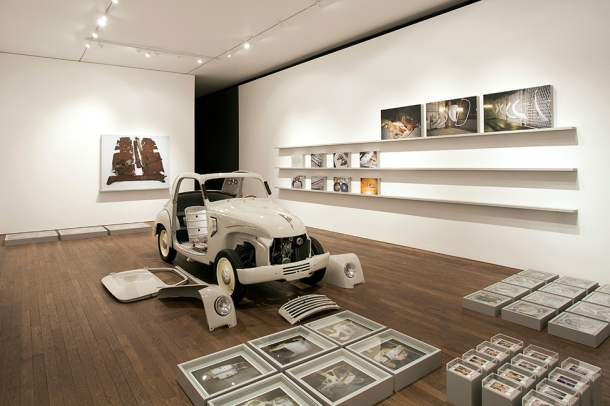
In the first of two collaborations with the excellent blog hosted by the Photographers Gallery in London, Jennabeth Talliaferro, a student on our MA Creative Writing: Writing the City, has contributed a short piece on Erik Kessels’ installation at the Gallery, Unfinished Father.
“Like legacy, photography is an overlapping of the past and present. In Erik Kessels’ work, Unfinished Father, the artist achieves simultaneous representation of these seemingly separate ideas. His father’s dilapidated and gutted Fiat Toppolino is juxtaposed with photographs of car parts orderly displayed. The viewer sees an old car whose former life and purpose are a mere memory.”
You can read the rest of Jennabeth’s piece here.

Saturday 25th-Sunday 26th June 2016
Room UG04, 309 Regent Street, London W1B 2HW
The Hypothetical: Institutions, Fictions, Environments
A hypothesis is literally a placing under, and thus a foundation or basis for an argument. As a foundation, though, a hypothesis is less than concrete; it is a starting point, a premise, a conjecture, a supposition. A hypothesis stands in a provisional relation to the known facts — may, indeed, fly in the face of the facts — and at worst can be described as a mere assumption or guess. A hypothesis, then, is a provocation. It demands investigation, testing, evaluation, perhaps refutation. A hypothesis has expectations.
The purpose of this conference is to interrogate the ramifications of the hypothetical in its philosophical, scientific, technological, historical, literary and artistic forms. How do the fictional, the conjectural, or the notional provide the operational conditions for new knowledge, new social and political forms, and new modes of describing the world? What are the temporalities that govern the hypothetical? How does the hypothetical put pressure on existing forms and practices, within and across the arts and the sciences? Are there limits — organisational, structural, ideological, disciplinary — beyond which the hypothetical collapses into the simply impossible? Or is the impossible an ideological bracketing of the emancipatory potential of the hypothetical? Alternatively, does the hypothetical run the risk of producing hypocriticism, a mode of reflexive and opportunist self-interest that merely reinscribes the position of the hypothesist?
Speakers: Claudia Aradau (King’s College London); Mark Currie (Queen Mary, University of London); Elizabeth Ellsworth & Jamie Kruse (by video link) (The New School, New York City); Mikhail Epstein (Durham University); Greg Garrard (University of British Columbia); John Richard Sageng (University of Oslo); David Wittenberg (University of Iowa).
View the conference programme here
Contact: John Beck j.beck@westminster.ac.uk
The conference is free but it is essential to register via Eventbrite
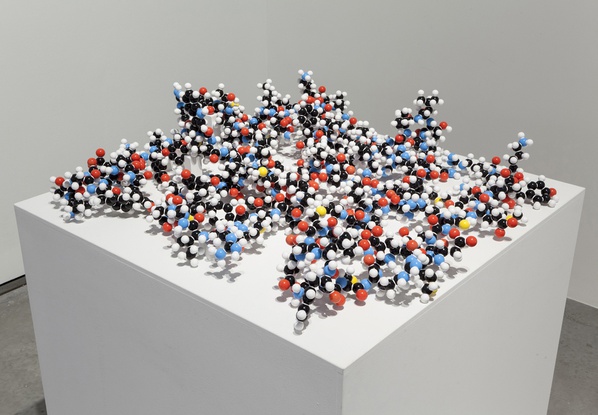
Monday 23 May 2016, 7pm, Carroll / Fletcher, 56-57 Eastcastle Street, London, W1W 8EQ
Tickets £5 available here
Christian Bök, an experimental poet and conceptual artist will discuss the intellectual foundation for his innovative experiment, The Xenotext – a work that required Bök to engineer the genome of an unkillable bacterium so that the DNA of such an organism might become not only a durable archive that stores a poem for eternity, but also an operant machine that writes a poem in response. The presentation will be accompanied by literary readings of poetry, produced in response to his research.
The talk will be followed by a conversation between Christian and the IMCC’s John Beck.
This is the fourth event in the Experimental Writing @ Carroll / Fletcher series. Organised by the Institute of Modern and Contemporary Culture at University of Westminster and Carroll / Fletcher, the series showcases contemporary developments in experimental writing and their relationship to the visual arts.
Christian Bök is a Canadian experimental poet and artist. He is the author of Crystallography (Coach House Press, 1994), a pataphysical encyclopedia nominated for the Gerald Lampert Memorial Award, and of Eunoia (Coach House Books, 2001), a work of experimental literature, which won the Griffin Prize for Poetic Excellence. Bök has created artificial languages for two television shows: Gene Roddenberry’s Earth: Final Conflict and Peter Benchley’s Amazon. Bök is also known for his performances of sound poetry (particularly the Ursonate by Kurt Schwitters). His conceptual artworks, which include books built out of Rubik’s cubes and Lego bricks, have appeared at the Marianne Boesky Gallery in New York City as part of the exhibit Poetry Plastique. Bök is currently a Professor of English at the University of Calgary.
For more information, please contact either:
Kaja Marczewska: k.marczewska@westminster.ac.uk
or Asya Bachelis: asya@carrollfletcher.com
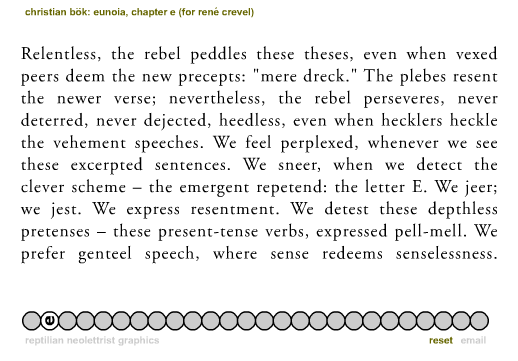
Monday 23 May, 11:00 am-1.30 pm, 309 Regent Street, London W1B 2UW.
We are delighted to announce a Masterclass with Canadian writer Christian Bök. The Masterclass is part of our Experimental Writing series and coincides with an event @Carroll/Fletcher later this month (further details will be available in due course).
This masterclass will introduce some of the techniques of Conceptualism, a school of writing that often uses technical resources on the Internet to explore the aesthetics of “the uncreative”: for example, the readymade writing of the unoriginal text; the mannerist writing of the constrained text; the illegible writing of the unreadable text; and the aleatoric writing of the authorless text. The class explores these four ways of writing so that participants might torque them to their own, otherwise “creative,” purposes.
Participation in the Masterclass is free but places are limited and registration is essential. While priority will be given to postgraduate students (both taught and research) and early career researchers, all applications are welcome!
For further information, please contact Kaja at k.marczewska@westminster.ac.uk
Registration: http://goo.gl/forms/9an5RDI9Y2
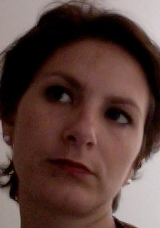
The IMCC is delighted to welcome Carmen Caruso as our visiting research fellow during the Spring and Summer of 2016. Carmen has a Ph.D. in Migration Studies (University of Catania), an MA in Gender Studies (SOAS), and a BA in Political Science (University of Bologna). She is a teaching assistant in Applied Ethics in the Philosophy Department at the University of Calabria (UNICAL). Carmen was a Postdoctoral Research Fellow at the Centre for Gender Studies at the School of Oriental and African Studies (SOAS) where she developed a project on the Lebanese diaspora in the UK from a gender perspesctive. To date, her research has focused on three interrelated areas of inquiry: human mobility (with an emphasis on diasporas from the Arab world), identity and citizenship, aesthetics and the material and performative dimension of culture. Recently she has edited a volume on the city of Jerusalem.


The Institute for Modern and Contemporary Culture
University of Westminster Department of English, Linguistics and Cultural Studies
32-38 Wells Street, London W1T 3UW. United Kingdom.

